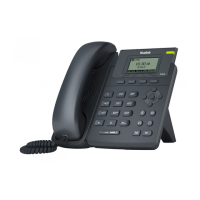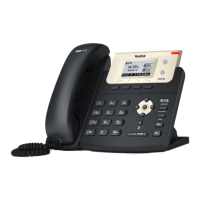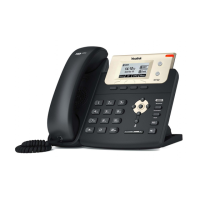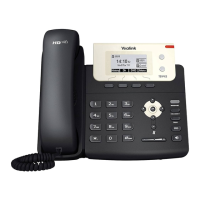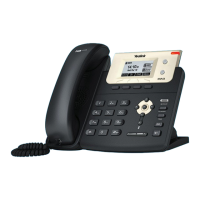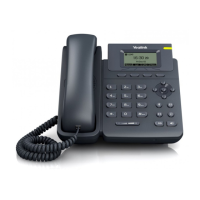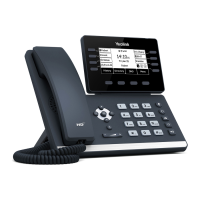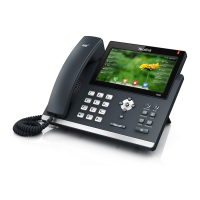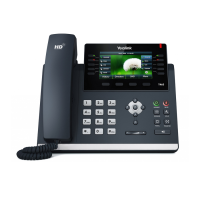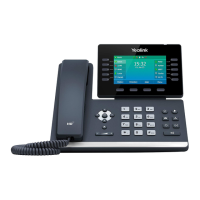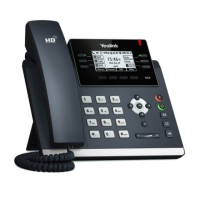Do you have a question about the Yealink SIP-T19 E2 and is the answer not in the manual?
Provides an overview of the guide's content, structure, and key sections.
Details revisions and updates across different guide versions.
Lists specific changes introduced for guide version 80.130.
Lists specific changes introduced for guide version 80.95.
Identifies and describes the physical parts and components of the IP phone.
Explains the meaning of various icons displayed on the phone's LCD screen.
Details the status indications provided by the phone's Power Indicator LED.
Describes the two primary methods for configuring the phone: phone and web interfaces.
Explains how to use the phone's on-device menu for configuration and operation.
Details how to access and use the phone's web-based configuration interface.
Lists available documentation for the IP phone, including Quick Start Guide.
Explains how to input text and numbers using the phone's keypad and different modes.
Describes the information displayed on the phone's screen when it is not in use.
Lists all items included in the IP phone package for initial setup.
Lists accessories that can be purchased separately for the IP phone.
Provides step-by-step instructions for physically setting up the IP phone.
Guides through the initial startup process and automatic network configuration.
Explains how to view network, phone, and account status information.
Details how to configure IP mode (IPv4, IPv6) and manual network settings.
Covers the process of registering the IP phone with the network and SIP server.
Covers basic phone customizations like contrast, language, time, and password.
Explains how to adjust the LCD screen contrast for better readability.
Details how to change the display language for the phone and web interfaces.
Guides on configuring time and date settings, including SNTP and manual methods.
Instructs on changing the default administrator password for security.
Explains how to assign the '#' or '*' key as a send key for dialing.
Describes how to lock the phone to prevent unauthorized access and its different types.
Covers audio-related customizations, including volume and ring tones.
Explains how to adjust ringer and receiver volume levels.
Guides on selecting and customizing ring tones for the phone and accounts.
Covers managing contacts, including directories, blacklist, and remote phone books.
Explains how to configure and manage contact directory sources.
Details how to add, edit, and delete contacts and groups in the local directory.
Describes how to add, edit, and delete contacts in the blacklist for call rejection.
Explains how to access and configure remote phone books.
Covers viewing, managing, and saving call history records.
Covers customizing phone features like logos and headset settings.
Explains how to upload a custom logo to be displayed on the idle screen.
Guides on activating, deactivating, and prioritizing headset usage.
Details the steps to switch headset mode on and off.
Explains how to enable and use the headset priority feature.
Describes how to enable and use two headsets simultaneously with the phone.
Covers customizing soft keys, navigation keys, and function keys on the keypad.
Guides on registering a SIP account on the IP phone through the phone interface.
Explains how to configure rules to replace strings in dialed numbers.
Details how to set up rules for automatic dialing of specific number patterns.
Guides on configuring area codes for dialing numbers outside the local area.
Explains how to block specific numbers from being dialed on the phone.
Details how to configure emergency numbers for quick dialing, even when the phone is locked.
Covers various methods for initiating calls using the handset, speakerphone, or headset.
Explains how to place calls using the phone's handset.
Details how to place calls using the hands-free speakerphone mode.
Guides on placing calls using a connected headset.
Explains how to answer incoming calls using different audio modes.
Describes how to terminate an active call using soft keys or hanging up.
Guides on redialing the last dialed number or selecting from call history.
Explains how to enable and view the placed calls list while dialing.
Details how to configure the phone to automatically answer incoming calls.
Explains how to enable and configure automatic redial attempts for busy numbers.
Guides on how to be notified when a busy party becomes available.
Describes how to configure a key to call back the last incoming call.
Explains how to mute and unmute the microphone during an active call.
Details how to place calls on hold and resume them.
Guides on activating and configuring the DND feature to reject incoming calls.
Explains how to configure static and dynamic call forwarding.
Details how to forward incoming calls to another party when the phone is ringing.
Covers blind, semi-attended, and attended call transfer methods.
Details how to enable or disable call waiting and play warning tones.
Explains how to set up local and network conference calls.
Guides on setting up a conference call with up to three participants.
Details how to configure and use network conference features.
Explains how to place calls on hold and retrieve them from other phones.
Covers directed and group call pickup methods for answering calls.
Guides on enabling and configuring directed call pickup codes.
Details how to enable and configure group call pickup codes.
Explains how to make calls anonymously and configure related settings.
Guides on how to configure the phone to reject calls from anonymous callers.
Explains how to use shared phone resources by logging in and out of accounts.
Covers intercom features like accepting calls, muting, tones, and barging.
Details how to automatically answer intercom calls during an active call.
Explains how to broadcast announcements to groups using RTP streams.
Guides on configuring and sending RTP streams via paging list keys.
Covers configuring the phone to receive RTP streams from multicast addresses.
Defines the priority of active calls during incoming multicast paging.
Determines how the phone handles incoming multicast paging calls when busy.
Explains how to configure a Music on Hold Server account for calls on hold.
Covers sharing an extension across multiple IP phones for simultaneous ringing.
Guides on configuring SCA settings for shared line appearance.
Details how to configure the call pull feature access code.
Explains how to use SCA features like placing calls and answering on shared lines.
Details how to place calls on a shared line and manage multiple calls.
Guides on answering incoming calls on shared lines.
Explains how to share a SIP line on multiple phones and monitor status.
Guides on configuring BLA settings for shared line appearance on IP phones.
Explains how to use BLA features like placing calls and answering on bridged lines.
Details how to place calls on a shared line and manage multiple calls.
Guides on answering incoming calls on bridged lines.
Covers sending, receiving, reading, and deleting text messages.
Explains the process of sending and receiving text messages on the IP phone.
Details how to leave, listen to, and configure voice mail access.
Describes how new voice messages are indicated on the phone.
Covers common problems like finding phone info and obtaining MAC addresses.
Addresses issues related to a blank LCD screen or incorrect time/date display.
Explains how to resolve issues accessing the web UI and changing user passwords.
Troubleshoots problems related to not receiving calls, DND, call forward, and blacklist.
Addresses problems with the headset and handset not functioning correctly.
Covers troubleshooting for missing dial tone, no ring, or call hold tones.
Guides on exporting PCAP traces and system logs for analysis.
Covers troubleshooting related to rebooting, upgrading firmware, and resetting the phone.
Details the process of upgrading the IP phone's firmware via the web interface.
Explains how to reset the phone to factory default settings to resolve persistent issues.
Information regarding service agreements applicable to Yealink products.
Disclaims Yealink's liability for various damages related to product use.
Provides essential safety precautions for device installation and operation.
Basic safety guidelines for handling, storage, and use of the device.
Specifies conditions for placing and operating the device in its environment.
Outlines requirements for proper and safe operation of the device.
Provides instructions on how to clean the device safely.
| Lines | 2 |
|---|---|
| Supported Protocols | SIP |
| Local Phonebook | 1000 entries |
| Wall Mountable | Yes |
| Operating Humidity | 10% to 90% (non-condensing) |
| Network Interface | 1 x 10/100 Mbps Ethernet |
| Audio Codecs | G.711, G.722, G.729 |
| Headset Port | 3.5 mm |
| Operating Temperature | 0°C to 40°C (32°F to 104°F) |
| SIP Versions | SIP V1 (RFC2543), SIP V2 (RFC3261) |
